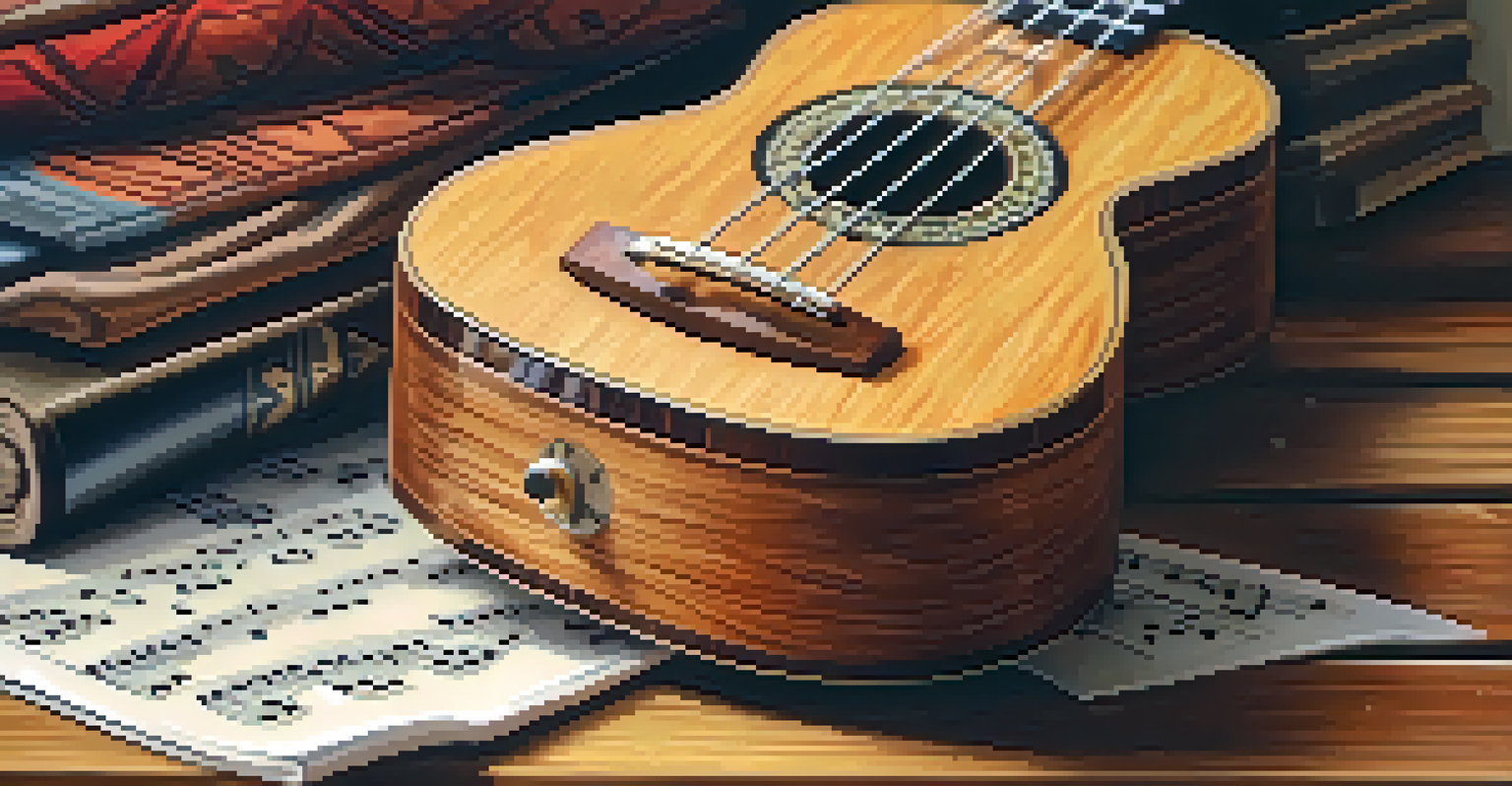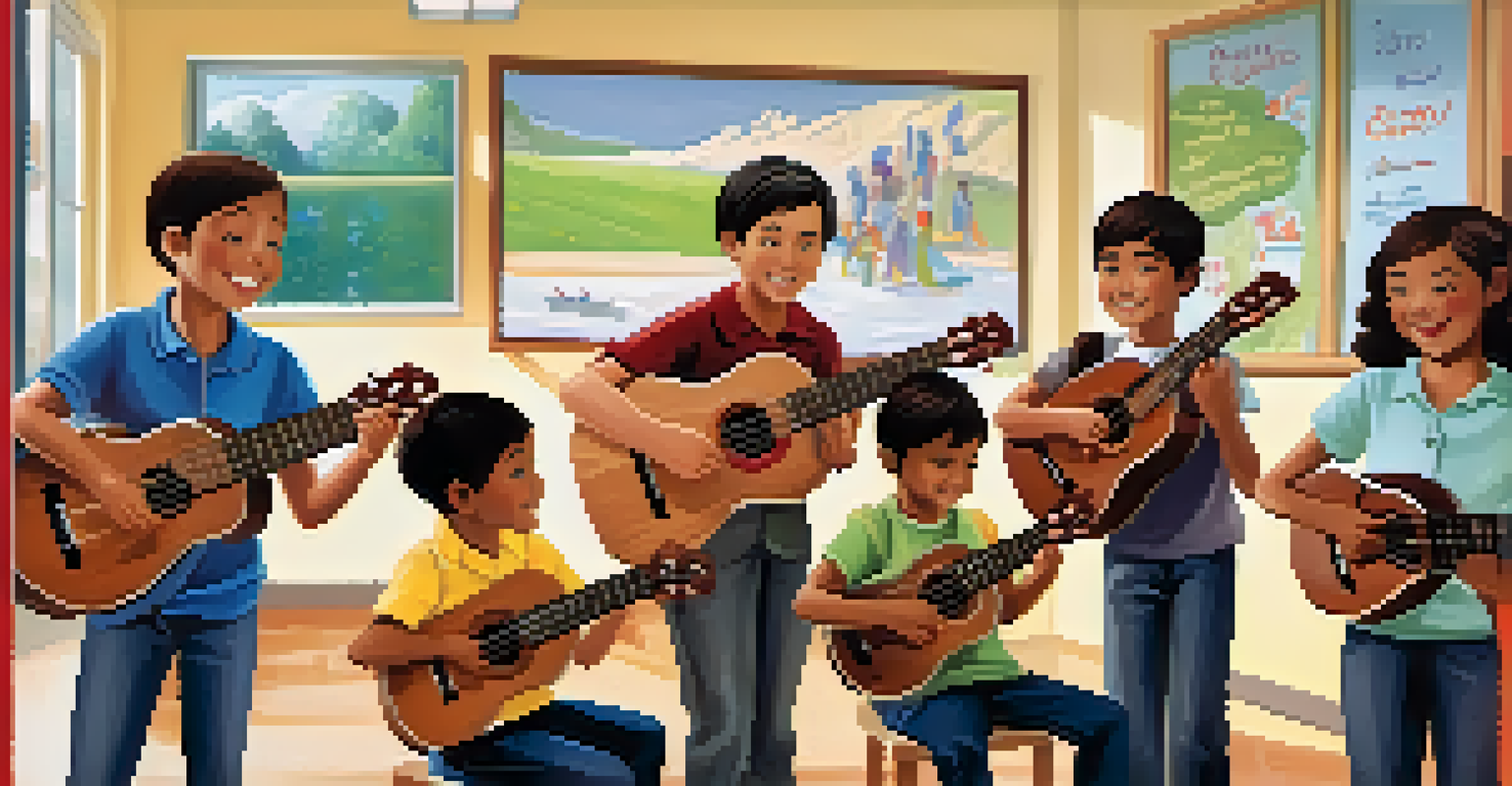Sharing Cultures: The Ukulele's Influence on Global Music Scenes

The Ukulele's Humble Beginnings in Hawaii
The ukulele originated in the 19th century in Hawaii, crafted by Portuguese immigrants who brought their braguinha. This small, guitar-like instrument quickly captured the hearts of locals, becoming a symbol of Hawaiian culture. Its cheerful sound and approachable design made it easy for anyone to learn, fostering a sense of community among musicians and listeners alike.
The ukulele is a joyful instrument, and it brings joy to everyone who plays it.
As the ukulele grew in popularity, it transcended its Hawaiian roots and began to spread across the globe. By the early 20th century, it had made its way to the mainland United States, where it was embraced by jazz musicians and popular artists. The ukulele's unique sound added a new dimension to the music of the time, influencing genres and inspiring countless musicians.
Today, the ukulele remains a beloved instrument worldwide, celebrated for its portability and versatility. From traditional Hawaiian music to contemporary pop and indie genres, its influence can be seen across various music scenes, making it a true global ambassador of sound.
The Ukulele in American Music History
The ukulele found its place in American music during the early 20th century, especially in the jazz and swing scenes. Renowned artists like Cliff Edwards and later, the likes of Tiny Tim, showcased its charm, bringing the instrument into mainstream consciousness. Its quirky, playful sound resonated with audiences, making it a staple in various musical performances.

By the 1960s, the ukulele was further popularized through the folk music revival, with artists like The Kingston Trio popularizing its use in their songs. This era introduced the instrument to a new generation, sparking a renewed interest that continues today. Its presence in popular music has contributed to its image as a fun, accessible instrument for aspiring musicians.
Ukulele's Cultural Origins
The ukulele originated in 19th century Hawaii and became a symbol of local culture, quickly spreading worldwide.
The influence of the ukulele on American music is undeniable, as it has shaped countless songs and styles. Its unique ability to blend with various genres allows it to remain relevant, making it a beloved choice for musicians seeking to incorporate a fresh sound into their work.
Cultural Exchange Through Ukulele Festivals
Ukulele festivals have sprung up around the world, celebrating the instrument's diverse cultural heritage. These events bring together musicians and enthusiasts from various backgrounds, fostering a sense of community and shared passion for music. Festivals like the Ukulele Festival of Great Britain and the Hawaii Ukulele Festival showcase talent and encourage collaboration among artists.
Music is a universal language. It connects us all, and the ukulele is a wonderful bridge.
During these gatherings, participants not only perform but also share techniques, songs, and stories, creating a vibrant atmosphere of cultural exchange. Workshops and jam sessions allow attendees to learn from one another, further solidifying the ukulele's role as a bridge between different music scenes. This spirit of collaboration enriches the global music landscape, making it more inclusive and diverse.
As ukulele festivals continue to grow in popularity, they highlight the instrument's ability to connect people across cultural boundaries. These celebrations remind us that music is a universal language, fostering understanding and appreciation for different traditions and styles.
The Ukulele's Role in Modern Pop Culture
In recent years, the ukulele has seen a resurgence in modern pop culture, making appearances in viral videos, movies, and TV shows. Its lighthearted sound fits perfectly with the upbeat and often whimsical themes of contemporary media. This exposure has introduced the ukulele to a wider audience, inspiring many to pick up the instrument for themselves.
Artists like Jason Mraz and Ed Sheeran have incorporated the ukulele into their music, showcasing its versatility and appeal. Their catchy tunes and relatable lyrics have made the ukulele a favorite among fans, further solidifying its status in today’s music scene. This trend has sparked a renewed interest in learning the instrument, especially among younger generations.
Impact on Modern Music
The ukulele has seen a resurgence in modern pop culture, inspiring many new musicians and appearing in popular media.
The ukulele's representation in pop culture not only elevates its status but also encourages a sense of belonging for aspiring musicians. As more people engage with the instrument, it creates a community of learners who share their experiences and love for music.
Global Variations: The Ukulele Around the World
As the ukulele traveled the globe, it adapted to different cultures, leading to unique variations and styles. In places like Japan, the ukulele has been embraced in genres such as pop and traditional folk music, blending seamlessly with local sounds. These adaptations demonstrate the instrument's versatility and its ability to resonate with diverse audiences.
In addition to Japan, countries like the Philippines and New Zealand have made the ukulele an integral part of their musical identity. Filipino artists often incorporate it into their lively performances, while New Zealand’s Māori culture has embraced the instrument in traditional and contemporary music. This cross-cultural exchange highlights the ukulele's capacity to unite people through shared musical experiences.
These global variations not only enrich the ukulele's history but also contribute to a broader understanding of music as a universal language. The instrument's journey reflects the power of cultural exchange, inspiring musicians and listeners alike to explore new sounds and styles.
Educational Impact of the Ukulele in Schools
The ukulele has become a popular choice for music education in schools around the world. Its small size and light weight make it accessible for young learners, while its simple chords allow students to start playing quickly. This ease of learning encourages children to explore their musical interests and develop a lifelong love for music.
Many educators have recognized the ukulele's potential to foster creativity and collaboration in the classroom. Group activities, such as ensemble playing and songwriting, promote teamwork and communication skills among students. By incorporating the ukulele into music curricula, schools are able to create a fun and engaging learning environment.
Educational Benefits in Schools
The ukulele's accessibility makes it a popular choice for music education, fostering creativity and collaboration among students.
Moreover, the ukulele's positive impact on students extends beyond music education. Research has shown that learning an instrument can enhance cognitive skills, boost confidence, and improve social interactions. As more schools adopt the ukulele as a teaching tool, it continues to inspire the next generation of musicians.
The Future of the Ukulele in Global Music
As we look to the future, the ukulele is expected to maintain its influence on global music scenes. With the rise of social media platforms like TikTok and YouTube, aspiring musicians can easily share their ukulele performances, reaching audiences worldwide. This accessibility allows for continuous innovation and collaboration among artists from different cultures.
The ukulele's adaptability ensures that it will continue to evolve, blending with emerging musical trends and genres. As new artists experiment with its sound, we can expect to see fresh interpretations that challenge traditional notions of what the ukulele can do. This evolution keeps the instrument relevant and exciting for both players and listeners.

Ultimately, the ukulele's journey reflects the ever-changing landscape of music and culture. Its ability to connect people across borders and inspire creativity ensures that it will remain a cherished instrument in global music for years to come.